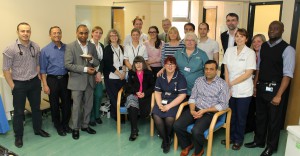 Patients at Heart of England NHS Foundation Trust are benefiting from a new service that sees 43% more patients admitted to a specialist stroke bed within four hours to receive the lifesaving care they need in the first 72 hours after a stroke.
Patients at Heart of England NHS Foundation Trust are benefiting from a new service that sees 43% more patients admitted to a specialist stroke bed within four hours to receive the lifesaving care they need in the first 72 hours after a stroke.
Heartlands Hospital now manages all emergency stroke admissions across the Heart of England NHS Foundation Trust in its new Hyper Acute Stroke Unit (HASU), and 81% of patients are admitted within the four hour standard, compared to 38% in 2014. The team sees patients from across Birmingham, Solihull, Sutton Coldfield, South Staffordshire and Warwickshire.
Not only has this led to significant improvements in care for patients, including quicker administering of a life-changing drug to stop further blood clots and access to a multi-disciplinary team at one hospital site, it’s has also meant that the hospital has been rated as level A by the Sentinel Stroke National Audit Programme (SSNAP), one of only two Trusts in the region that hold an A rating. This is a huge improvement from a D rating in 2014. SSNAP clinical audit scores stroke teams on 44 aspects of care – from when a patient arrives at hospital to when they are discharged.
There are 30 stroke beds at Heartlands, made up of 16 hyper acute and 14 acute beds, plus a further 15 acute beds at Solihull and 22 acute beds at Good Hope Hospital. Once the patient is stable, they are discharged home or transferred back to an acute bed at their local hospital if they require rehabilitation.
The team see between 5 and 20 new patients a day, making it one of the biggest and busiest centres in the UK.
Matthew Cooke, deputy medical director at Heart of England NHS Foundation Trust, said: “Our staff have worked incredibly hard to make these important changes to our stroke service and I’d like to thank them for their efforts. They have made significant improvements for our patients, leading to better outcomes for seriously ill patients and meaning more people are going home without any disability after a stroke.”






